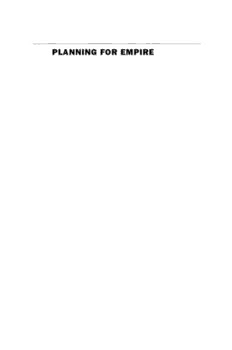
Planning for empire: reform bureaucrats and the Japanese wartime state PDF
Preview Planning for empire: reform bureaucrats and the Japanese wartime state
PLANNING FOR EMPIRE Studies of the Weatherhead East Asian Institute, Columbia University The Weatherhead East Asian Institute is Columbia University’s center for research, publication, and teaching on modern and contemporary East Asia regions. The Studies of the Weatherhead East Asian Institute were inaugurated in 1962 to bring to a wider public the results of significant new research on modern and contemporary East Asia. Planning for Empir e Reform Bureaucrats and the Japanese Wartime State Janis Mimura CORNELL UNIVERSITY PRESS, ITHACA AND LONDON Copyright © 2011 by Cornell University All rights reserved. Except for brief quotations in a review, this book, or parts thereof, must not be reproduced in any form without permission in writing from the publisher. For information, address Cornell University Press, Sage House, 512 East State Street, Ithaca, New York 14850. First published 2011 by Cornell University Press Printed in the United States of America Library of Congress Cataloging-in-Publication Data Mimura, Janis, 1963– Planning for empire : reform bureaucrats and the Japanese wartime state / Janis Mimura. p. cm. — (Studies of the Weatherhead East Asian Institute, Columbia University) Includes bibliographical references and index. ISBN 978-0-8014-4926-0 (cloth : alk. paper) 1. Japan—Politics and government—1926–1945. 2. Bureaucracy—Japan— History. 3. Technological innovations—Japan—History. 4. Fascism— Japan—History. 5. Civil-military relations—Japan—History. 6. Manchuria (China)—History—1931–1945. I. Title. II. Series: Studies of the Weatherhead East Asian Institute, Columbia University. DS888.5.M546 2011 952.03'3—dc22 2010037180 Cornell University Press strives to use environmentally responsible suppliers and materials to the fullest extent possible in the publishing of its books. Such materials include vegetable-based, low-VOC inks and acid-free papers that are recycled, totally chlorine-free, or partly composed of nonwood fibers. For further information, visit our website at www.cornellpress.cornell.edu. Cloth printing 10 9 8 7 6 5 4 3 2 1 For my father, Takuo Mimura, and in memory of my mother, Akiko Mimura Contents Acknowledgments ix Introduction 1 1. Japan’s Wartime Technocrats 7 2. Military Fascism and Manchukuo, 1930 –36 41 3. Bureaucratic Visions of Manchukuo, 1933–39 70 4. Ideologues of Fascism: Okumura Kiwao and Mo¯ri Hideoto 107 5. The New Order and the Politics of Reform, 1940–41 138 6. Japan’s Opportunity: Technocratic Strategies for War and Empire, 1941–45 170 Epilogue: From Wartime Techno-Fascism to Postwar Managerialism 195 Bibliography 201 Index 221 Acknowledgments I am grateful for the assistance that I have received from numerous individuals and institutions in completing this study. First and foremost, I thank my teachers at Berkeley, Andrew Barshay and Irwin Scheiner, whose guidance, enthusiasm, and support sustained me in the long road to this book. In Japan, I am indebted to Kobayashi Hideo, Hara Akira, Imura Tetsuo, Ito¯ Takashi, Kawahara Hiroshi, and Kudo¯ Akira for generously sharing their time, advice, and insights on war- time Japan. Masayo Takashi helped me access valuable Manchuria archives, and Kobayashi Hideo, Imura Tetsuo, and Satoshi Sasaki shared some of their own primary documents on wartime planning. In the process of research and writing I benefitted from the advice and assistance of Katalin Ferber, Louise Young, Ger- ald Feldman, Michael Barnhart, Miles Fletcher, Bai Gao, Mark Metzler, Tatsushi Hirono, Sharon Holt, and Donna Rilling. The book was considerably improved by the detailed comments and suggestions of Larry Frohman, Richard Smethurst, and two anonymous readers from Cornell University Press. I thank Roger Hay- don at Cornell University Press for his expert guidance and Jack Rummel for copy editing the manuscript. I also wish to thank Carol Gluck, Kim Brandt, and the staff at the Weatherhead East Asian Institute for their assistance in publishing this book. Research and writing were made possible by grants from the Fulbright Foun- dation; University of California at Berkeley, Department of Education Foreign Area Language Studies Program; the New York State United University Pro- fession Drescher Program; and the Deutscher Akademischer Austauschdienst. Kirsten Refsing and the Department of Japanese Studies at the University of Hong Kong provided me with a congenial place to write. Carl Steenstrup and Franz Waldenberger arranged for my affiliation as a visiting scholar at the Uni- versity of Munich. I warmly thank Kobayashi Hiroko, Miyahara Hiromichi, Susan Barclay, John Lee, Pam Burdman, Allison Rottman, George Mimura, and Laura Mimura for their assistance during my various travels between the United States, Germany, and Japan. Finally, I cannot adequately express my gratitude for the patient and loving support of my husband, Martin Kock, and daughters, Karina and Vivien. ix
